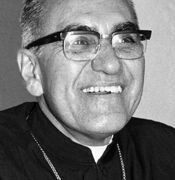- Home
- About Us
- Our Houses
- Romero
Romero

St Oscar Romero (1917 – 1980)
Justice, Peace and Freedom
“Aspire not to have more, but to be more!”
St Oscar Romero is a modern saint that many young Catholics today are aware of, both due to his recent canonisation and the way CAFOD have advocated his example when working for social justice. He was a popular choice amongst students when we updated our house system, with so many of our young people connecting faith with helping your neighbour and speaking up for them.
Oscar Romero was born in 1917 in Ciudad Barrios, El Salvador. At the young age of 14 years old he felt the call to be a priest and began his studies at seminary. He was ordained a priest in 1942 after a period of study in Rome and returned to his home country of El Salvador. Romero was admired as a quiet and unassuming pastor, a great preacher who cared deeply for the flock of Christ.
St Oscar Romero was martyred because he spoke the ‘unpopular opinion’ and challenged the injustice of his time. This heavily resonates with me in our day where pain and suffering are so common – we need his example to influence each of us to stand up for what is right.
- Ashley, Year 11
Amongst the backdrop of political unrest and increasing violence in his home country, Romero became Archbishop of San Salvador in 1970. To those in government terrorising the people of El Salvador and the rich of society, Oscar Romero was seen as a safe pair of hands who wouldn’t cross the divide between faith and politics. For a while they were right, but the increase in violence and killing of his good friend, Fr Rutilio Grande changed Oscar Romero forever.
The following Sunday he allowed only one Mass in the entire diocese to be celebrated, it was at the Cathedral, where he could speak out against the murders and capture the attention of all. As unrest increased, Romero spoke louder, ensuring his weekly Sunday homily was broadcast to the nation via radio and refusing to be censored.
In a matter of weeks Romero had become an outspoken champion of the poor and oppressed in El Salvador, using his prominent position to be an outspoken critic of the ruling elite. He openly opposed the fact that 60% of land in El Salvador was owned by 2% of the population. He was fiercely opposed to the class system, famously asking “by what right have we catalogued persons as first-class persons or second-class persons? In the theology of human nature there is only one class: children of God”.
It was commonplace for members of the rural poor and activists who opposed the junta government to be assassinated, and the military popularised the slogan ‘Be a Patriot - Kill a Priest’. Romero continued to speak out, denouncing the torture, disappearance and killings of community leaders, supporting victims, championing the poorest, and highlighting the injustice of police and army crimes. Amongst a backdrop of the worst atrocities Oscar Romero continuously responded with a message of peace, justice and reconciliation. However, this put his life at greater risk with constant death threats, harassment by security forces and the radio station being bombed.
On the 23rd March 1980 Romero delivered perhaps his most famous homily, in which he directly addressed members of the military telling them, “It is time to regain your conscience. In the name of God and the name of the suffering people, I implore you, I beg you, I order you, stop the repression!” This final act of defiance resulted in his assassination the following day in the middle of Mass.
His funeral was said to have been attended by a quarter of a million people. In the civil war that followed for another ten years more than 75,000 people were murdered or disappeared. Oscar Romero became a symbol of peaceful resistance, an icon for the people of El Salvador, a global inspiration for human rights. He was canonised in 2018.
He is a worthy house saint, reminding each one of us to use our voice as a microphone for those who cannot.